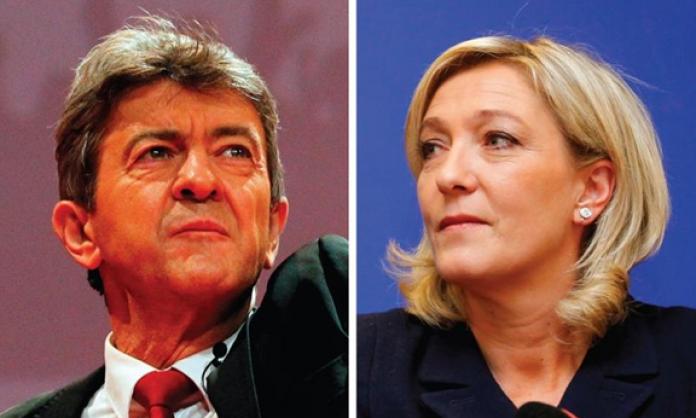The presidential elections have exposed the political polarisation of French society. For the first time in the post-war period, the two major establishment parties have been left out of the second round of the country’s elections.
And for the second time, the fascist National Front (FN) has made it past the first round, with party leader and presidential candidate Marine Le Pen increasing her vote by more than a million, receiving more than 21 percent of total. The first round winner, Emmanuel Macron, garnered 23.9 percent on a vague platform of pro-EU liberalism, which he presented as transcending the political divide, stressing throughout the campaign that he was “neither of the left nor the right”.
That this result reflects the global political crisis of establishment politics is reflected in both candidates – one a fascist, the other a banker – portraying themselves as political outsiders. Neither is. Marine Le Pen inherited the FN from her father, the raging racist Jean-Marie Le Pen, and has been an active player in national politics for over a decade. Macron served as minister for the economy during the disastrous Hollande Socialist Party (PS) government. Before that, he was an investment banker for Rothschild & Co, representing only the top French enterprises.
The collapse of the major political party vote – the centre-right Republicans and the neoliberal PS – also illustrates how deep the political crisis runs. Between them, they were able to cobble together only 26 percent of the vote, a historic low. The Republican candidate, François Fillon, began the race as the ruling class favourite, only to be embroiled in scandal: he had paid his wife Penelope a salary for a fictitious parliamentary post.
PS voters picked Benoît Hamon in their January primaries, a decision widely seen as a break from the right wing legacy of former president François Hollande and his PM Manuel Valls. But Hollande and Valls damaged the party’s brand beyond repair. Many are predicting that this will be the end for the Socialist Party. It is sure to suffer splits and resignations after managing to win only 6 percent of the vote.
The biggest surprise, however, was the rise of left wing candidate Jean-Luc Mélenchon, formerly of the Left Front and running under the banner of La France insoumise (“Insubordinate France”), a loose collection of activists and supporters. Mélenchon was the main beneficiary of the PS breakdown, finishing with almost 20 percent of the vote, just behind centre-right Fillon. That Mélenchon came fourth – and just 2 percent below Le Pen – on an explicitly left wing program of taxing the rich, increasing public spending and overhauling the country’s political system, is a positive sign and shows that the country’s justified anger at the political class isn’t being funnelled exclusively into support for the far right.
Marine Le Pen managed to get through to the second round of the presidential race, winning more than seven and a half million votes. While her economic platform would reverse regressive changes to the labour code and create some protectionist measures, her stock in trade pledges were for a “Frexit” referendum and to halt all immigration.
However, it’s clear that there’s also a limit to Le Pen’s support. She tried desperately to make this campaign about immigration and race, taking full advantage of the shooting of a policeman in Paris on the Thursday before the vote. But that event did not substantially increase her vote.
The clear winner of the first round was Emmanuel Macron. After the ignoble downfall of François Fillon, the French political establishment switched gears and put Macron up as their candidate of choice. As minster for the economy, Macron passed the “Macron laws”, a series of pro-business neoliberal measures that helped cement the idea among French workers and students that Hollande had betrayed them. Like a rat fleeing a sinking ship, Macron saw that his political fortunes lay outside the doomed PS and formed En Marche! (“On the move!”) in 2016. Macron positioned himself as socially progressive, pro-EU and pro-business. However, his platform was light on content or details. He said that he would take the best ideas from both the left and the right.
Macron received the endorsement of key right wing PS figures, including former prime minister Valls. Macron is now the French ruling class’ last-ditch attempt to stabilise the political system and attack the historic gains of the working class. As left wing intellectual Frédéric Lordon wrote:
“It was certain that a moribund world that is still very determined not to give up anything would end up finding an appropriate candidate, the individual capable of all the ambivalences required by the special situation. That is, a candidate capable of speaking and saying nothing, saying nothing but constantly thinking about ‘it’, being at the same time utterly empty and dangerously charged with content.”
However, while the ruling class might be breathing a sigh of relief at Macron’s early lead, its members might want to hold off popping the Dom Pérignon. All polls have Macron beating Le Pen at 60 per cent to 40. But this margin is slimmer than in 2002, the last time the FN made it to the second round, when conservative Jacques Chirac beat Jean-Marie Le Pen with a record 82 percent of the vote.
The anger of French workers and youth is not going away. The political elite has enriched itself while unemployment has risen and living conditions have fallen. With elections scheduled for Britain, Germany and Italy in the next 12 months, the crisis of European politics could deepen.










